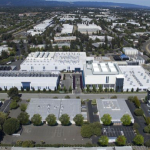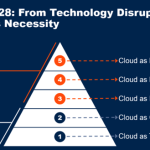Amazon Has Long Ruled the Cloud. Now It Must Fend Off Rivals.

The tech giant is under attack as Microsoft and other rivals try to capture a bigger slice of the $266 billion cloud-computing market.
By Dana Mattioli and Aaron Tilley Jan. 4, 2020
A new storm is building in the cloud.
Amazon.com Inc. AMZN and Microsoft Corp. MSFT are turning up the pressure on each other as they battle to supply corporate America with remote computing power, stoking a fight that is expected to dominate the tech world over the next decade. Revenues from this business—known as cloud computing—jumped 246% in the previous decade, according to a 2020 estimate from research firm Gartner Inc. IT 1.58%
Some of the sharpest barbs are now coming from Amazon, long the dominant provider of data storage to large multinationals. Andy Jassy, chief executive of Amazon Web Services, targeted Microsoft in remarks last month to attendees of the company’s annual cloud-computing gathering in Las Vegas.
“They are not prioritizing what matters to you guys as a customer,” said Mr. Jassy of Microsoft. Rivals, he said, were often mere copycats. “There are a lot of companies that have become pretty good at being checkbox heroes, where they kind of look at something we have and they rush to have it out there and say we have it too.”
Some of Mr. Jassy’s customers took note. In a private dinner involving some CEOs of companies that use Amazon’s cloud services, attendees discussed Amazon’s apparent anxiety about rivals, particularly crosstown rival Microsoft. Now No. 2 in the cloud, Microsoft last year won a giant Pentagon cloud-computing contract for which Amazon was favored. The deal is valued at up to $10 billion over the coming decade. Amazon is contesting the outcome in court.
To lure customers, Microsoft has been telling potential clients that, unlike with Amazon, when they sign up for the company’s Azure cloud-computing business they won’t be placing valuable customer or product information into servers run by a potential rival.
“We’re not about using customer data and competing with them,” Julia White, corporate vice president of Microsoft Azure, said in an October interview.

Amazon is the undisputed leader in the cloud, but the lead is narrowing. Amazon had 47.8% of market share for renting out cloud infrastructure in 2018, down from 49.4% of market share the year before and 53.7% in 2016, according to Gartner. Microsoft is the second-biggest public cloud player with 15.5% of the market in 2018, up from 12.7% the year before and 8.7% in 2016, according to Gartner.
Amazon was early to embrace the cloud. The company was already investing heavily in computers and servers to run its core business more than a decade ago and realized it could rent some of that capacity to others. Customers could simply pay to use Amazon’s computing horsepower and forego big investments to buy and maintain their own equipment.
The business took off as more large multinationals looked to outsource their data storage. and represented around 13% of Amazon’s total sales through the first nine months of 2019. The Amazon Web Services cloud business, known as AWS, last year likely generated around $35 billion in sales for Amazon, according to company figures and analysts estimates. But that success also has put a big target on Amazon. Many of its rivals had a much longer history of working with business customers and grew tired of losing out. They have now ramped up their push to claw back sales.

Alphabet Inc.’s Google, a distant fourth in terms of global market share measured by Gartner, is increasing the size of its cloud sales team to catch up to Amazon and Microsoft and last June agreed to buy data-analytics firm Looker in a bid to bolster that part of its business. Similarly, Oracle Corp. last year announced it will bolster the size of its cloud-computing workforce to help secure more business. International Business Machines Corp. in 2019 closed a $34 billion deal for Red Hat Inc. to strengthen its cloud offering.
The companies competing for this business have built huge data centers known as server farms around the world that allow customers to rent storage space and tap some of the large computing horsepower the vendors offer to analyze that information. Customers pay for the amount of data they store and what features they use. Some customers sign up to pay-as-you-go models, others for other pricing packages. Costs to store a gigabyte of data can vary by market.
Cloud computing is expected to generate $266 billion in revenue this year, according to Gartner, and balloon by another 30% before 2023.
Amazon’s success in the cloud, more recently, has suffered setbacks beyond the lost Pentagon deal. Last year, one of its biggest banking customers, Capital One Financial Corp., had more than 100 million customer records stolen that were stored on Amazon’s cloud. And more big corporations are turning to other cloud vendors. Some are worried the online retail giant could become a competitor, according to people familiar with the matter. Many large multinationals have longstanding relationships with Microsoft or Oracle, but not with Amazon.
“What we’re seeing now is there’s another wave of late-adopter customers coming to market. These are customers that have never used cloud before, so they’re investigating,” said Raj Bala, research director at Gartner. “A fair number of these customers will certainly end up at [Microsoft’s] Azure, because they meet that profile: they run a lot of Windows, they tend to want to play it safe, and the decision makers in that camp tend to favor Azure to a large extent.”

Amazon has tried to fight the perception that in its expansion into new markets, such as logistics or health care, incumbents in those sectors using AWS need to worry about their data being used against them. “We’ve realized that could be a problem from day one,” Peter DeSantis, vice president of AWS’s global infrastructure business said in an interview. That’s why AWS treats Amazon’s retail arm as just another customer, he said. Amazon preserves the privacy of that data and doesn’t use it for other purposes, he added.
Amazon, in AWS sales pitches, also has tried to address those concerns head on. An official for a health care company that recently was shopping for cloud services said Amazon pointed to streaming video company Netflix Inc. as an example of a business that was comfortable with its service even though the retail giant has a competing online offering. The health care company signed up for Amazon’s cloud services.
Retail companies were among the first to be skittish about using AWS, given Amazon’s competitive clout. Walmart Inc., as early as two years ago, told vendors not to use the Amazon platform.
Unilever PLC, the consumer goods giant that has brands including Ben & Jerry’s and Vaseline, is using data analysis tools Microsoft offers for Azure to crunch some of its most sensitive customer and third-party vendor data, according to a person familiar with Unilever’s cloud strategy. That is even though Unilever works with Amazon in other areas, including to sell some of its wares. Unilever didn’t respond to requests for comment.
Amazon, which didn’t comment on Unilever’s decision, said its consumer business doesn’t get access to AWS data. “The vast majority of companies that compete with Amazon’s consumer business use AWS,” a company spokeswoman said.
Microsoft said sales for its Azure cloud business grew 59% in the most recent quarter compared with the year prior. AWS quarterly sales grew 34.7% from a year earlier, the latest in a series of quarters that saw growth slow.
Amazon has been trying to fight back on multiple fronts.

At an earlier annual AWS conference, Mr. Jassy held a private lunch with private-equity executives from firms such as Carlyle Group for the first time, according to a person familiar with the gathering. The aim was to woo private-equity firms, which own dozens of more mature companies, to Amazon’s cloud, according to the person familiar with the event. Such links would give Amazon access to a pipeline of new customers as the private-equity firms buy new companies, invest in technologies such as cloud-computing to help lower costs, and then sell or take them public.
Amazon has taken out ads to battle back. In one, it asserts that running a specific Windows database management system would cost half as much on AWS than on Microsoft’s own cloud.
AWS Chief Technology Officer Werner Vogels, last year, took to Twitter to take a jab at Microsoft, calling a change in the rival’s software licensing terms “bait+switch.” The remark is out of character for Amazon, whose CEO Jeff Bezos has publicly spoken about focusing on customers, not competitors.
Microsoft declined to comment.
Amazon also is playing defense on other fronts. It has filed a case in the U.S. Court of Federal Claims against the Pentagon’s decision to award Microsoft the Joint Enterprise Defense Infrastructure, or JEDI, contract. That selection process had been fraught, amid multiple conflict-of-interest allegations and legal challenges.
Amazon is suing the government, claiming bias against the company’s bid. While the competition was still running, President Donald Trump expressed concerns about the pending contract. “I’m getting tremendous complaints about the contract with the Pentagon and Amazon,” Mr. Trump told reporters at the time. “I will be asking them to look very closely to see what’s going on.”
Following the award to Microsoft, at the AWS jamboree last month, Mr. Jassy said “if you do a truly objective and detailed apples to apples comparison of the platforms, you don’t end up in the spot where the decision was made.”
Pentagon acquisition chief Ellen Lord last month said the Defense Department was moving forward on the JEDI contract irrespective of Amazon’s legal challenge.
—Asa Fitch contributed to this article.



